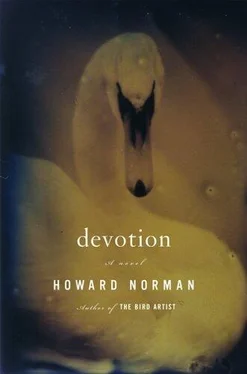“My room is 334,” Maggie said.
They left the bar and entered the lobby. The old Italian bell captain stood at his podium near the registration desk, just in front of the wooden mail-and-key hive, which in turn was adjacent to a storage room and coat rack. Three bellmen, also Italian, at their separate stations, in the formal hierarchical configuration noticeable to any true student of hotel lobbies, as David was, did not watch directly but of course noticed as Maggie and David walked up the central staircase, with its musty-looking maroon carpet, intricate throw rugs at each landing, framed prints of zoology and botany along the wallpapered corridors. In the dusky light of room 334 (no electrical lights turned on) David sat in a pale green overstuffed chair, with its thick armrests like separate flotation devices, should the room capsize. He felt sunk down into it. “Is this the same hotel in which you always don’t have a room when the ensemble’s in London?” he said.
Maggie was looking out the window onto George Street. “Who’s to say I didn’t phone in a reservation while at my appointment?” she said. “Me being both brazen and hopeful. Apparently.”
“Then I’m grateful they had a room available. It’s a nice hotel. I’ve walked by it a hundred times.”
“Never been in it, though?”
“Not till today, oddly enough.”
Maggie stepped out of her shoes. “Well, here we are, then,” she said. “I won’t say I’ve not done anything like this before. Because that might sound…I don’t know what. And besides, it wouldn’t be—”
“The truth? And why should it be true, anyway? I wouldn’t expect it to be true. ‘Unforeseen life intervenes on regular life’—that’s from a book. That’s not my original thought.”
“I’ve never done it with you before or in this hotel. Unforeseen— ”
She then placed her shoes side by side, but in the middle of the room, smiled at David, and he thought, as comprehensively and directly as he had ever thought anything, Where has she been?
“Well, David Kozol,” Maggie said. “You’re quite handsome, but so what?”
Turning back to look out the window, Maggie thought, Rain looks like Braille on the puddles , to her a surprisingly tactile image, obviously one that, deep down, corresponded to how she imagined David might soon touch her. She then slid off her black stockings, reached back and unzipped her black, ankle-length cotton dress, lifted it up over her head and let it fall to the floor. (David — and it may well have been a failure on the part of his imagination — had never before fantasized a woman undressing like this in front of him, certainly had not experienced it. He recalled a phrase from John Keats, on a Poem-a-Month broadside in a London double-decker, “wild surmise,” and let it articulate the moment.) She then glanced around the room, mostly taking in the quality of the light. Every inch of her body felt hastened, on the verge; also, she wished that she could impose her will on the light, somehow hurry it through dusk to dark. The streets were darker earlier than usual because of the cloud cover. This feeling must have largely been shyness, perhaps her wanting more to be touched than seen, yet every moment contains paradox, for there she was, enacting a boldness if not feeling exactly bold, slipping out of her bra and panties as David said, “I believe this could be—” Believe, like an act of faith. And then Maggie lay across David’s lap — he saw that a spray of freckles on her chest stopped at her breasts — fell slightly back in a comic swoon, then recovered and kissed him deeply; he tasted the lime; they kissed a long time while sitting in the chair. Resting — or recovering, they did not know which — they needed to catch their breaths; she had unbuttoned only the top three buttons of his dark gray shirt but had otherwise caressed where she could reach; then Maggie said, “It so happens that next door to us, in 336, is Michael Dunbar, woodwind player. He’s mostly playing oboe on this tour. He’s sleeping with Marianne Brockman. She’s from America. Maine, originally, I think. Miss Brockman is our principal cellist. She’s in 332, also next door. You’ll meet her, possibly, if we see each other past this afternoon.”
“Margaret.”
“Please don’t fall in love with her. Miss Brockman, I mean. I’m saying it protectively. She’s a bit— unstable. It’s hard to explain, really. I think it has to do with a cellist’s posture, the positioning of the cello itself. Maybe the sound of the instrument. But men, I’ve noticed, tend to fall in love with our cellist.”
David thought that she was speaking with the utmost analytical seriousness, not at all tongue-in-cheek. This had about it a touch of didactic and eccentric reasoning, and he was interested and amused, every new thing learned a revelation. Maggie kissed him again. “Across the hall, 335, is Rachel Neiman, flautist. She’s from Winnipeg,” Maggie said. “Flute — I don’t know why, because she plays it beautifully, but I’ve never warmed up to the flute. It sounds like some bird gone nuts. Rachel’s very pleasant, though. I’m closest to her, of this whole group. I forgive her for playing flute.”
“Let’s go over to the bed.”
“I just knew one of us was going to say that.”
“You’ve got no clothes on, Margaret, and I have clothes on. Canadians are by nature democratic, don’t you think?”
Their first time in bed together, they were at once awkward and unhurried. David undressed, pulled back the bedclothes, they lay down and held each other a few moments; David slid lower on the bed and kissed upward from Maggie’s knee. That late afternoon and early evening their lovemaking was interrupted only by a shared glass of whiskey, poured from a miniature bottle provided by the hotel at cost. At about seven o’clock, Maggie rose from the bed and carried her pocketbook into the bathroom (from David’s point of view, she had porcelain skin in that light), took an aspirin with a glass of water, because she knew that even so little whiskey would give her a headache, filled the glass again and carried it to David, who was parched and gulped it right down. At nine they ordered from room service, risotto and salad, but did not answer the door when the waiter knocked, and did not feel bad about it in the least. Then, around eleven, Maggie said, “I know nothing about you.”
“Not a lot biographically, that’s true. But for the last, what, six hours or so, you’ve learned something about me.”
“Oh, that. I’ve forgotten everything already.”
“Can you take the day off tomorrow?”
“We’re in the middle of a tour here. I’m relied on.”
“I don’t take your job lightly. I didn’t mean that. What I wanted to say—”
“What I want to say,” Maggie cut in, “is just the time spent. To my mind it’s a thing of consequence. I simply didn’t need anything else.”
“I do. I need to see you tomorrow.”
In a short while Maggie fell asleep. David reached across and took up her book from the bedside table. He recognized the cover of The Crime of Sylvestre Bonnard, a Modern Library edition. The bookmark was a sheet from the notepad placed next to the telephone. He read, surprised to hear himself read aloud, in a whisper, at random from page 198: “When I returned to the City of Books I heard Monsieur Gelis and Mademoiselle Jeanne chatting — chatting together, if you please! as if they were the best friends in the world.”
The passage, of course, meant nothing; all David cared about was that he was reading next to Maggie in bed in a hotel in London. He knew that had he merely found The Crime of Sylvestre Bonnard on the chair in the hotel lobby and read this passage, he would have closed the covers and set the book down for someone to retrieve. Yet when Maggie had, in the hotel bar, mentioned her college thesis on Anatole France, he vowed then and there to read every novel of his he could find.
Читать дальше












